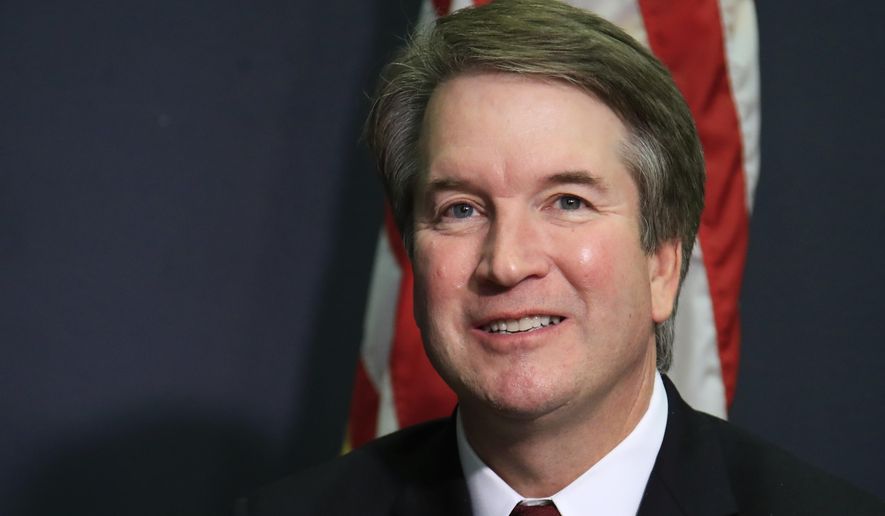As a White House lawyer Brett Kavanaugh was skeptical of Congress’s ability to impose major restrictions on fundraising in American politics, according to newly released emails that show him debating other White House lawyers over the constitutionality of the McCain-Feingold campaign finance bill.
Judge Kavanaugh said he thought restrictions on outside groups to be “blatantly unconstitutional” — a position the Supreme Court eventually took as well, striking down the 2002 law’s restrictions.
He also said, though, that limits on contributions to candidates themselves “have some constitutional problems.”
That stance is likely to anger Democratic senators who want more campaign finance restrictions, arguing that rich donors have gained too much influence in politics through their ability to fund outside groups that run ads influencing elections.
The emails were released Friday by the Senate Judiciary Committee at the request of Sen. Amy Klobuchar, Minnesota Democrat. They are among the more than 400,000 pages of documents turned over by the Bush presidential library to the Senate ahead of Judge Kavanaugh’s confirmation hearing next week.
The emails had been deemed protected and restricted only to senators, but after Ms. Klobuchar requested their release Chairman Chuck Grassley got them cleared by the Bush team and the Trump administration for public view. Mr. Grassley said Ms. Klobuchar is the only senator to take him up on that process.
In the emails Judge Kavanaugh is debating Helgard C. Walker, another lawyer in the White House, with Noel Francisco also included in the conversation. Mr. Francisco is currently the solicitor general for the Justice Department, while Ms. Walker is a lawyer in private practice.
Both Ms. Walker and Judge Kavanaugh appeared to think restrictions ran afoul of the Constitution, though they got into an intense email discussion over the role outside groups play in campaigns.
Judge Kavanaugh said issue ads from organizations such as the Chamber of Commerce or the Sierra Club can overwhelm the candidates themselves, and the candidates are at a disadvantage if they have to abide by limits, while the groups don’t.
“I agree that the issue ad restrictions are blatantly unconstitutional — although I think the policy goal of allowing the candidates to debate each other without background noise that overwhelms the candidates/campaigns themselves is quite laudable (albeit unconstitutional),” he wrote.
Ms. Walker said Judge Kavanaugh was demeaning outside groups by calling their voices “background noise.”
Judge Kavanaugh said he wasn’t trying to insult those voices, but did fear they could be too loud for the campaigns to break through.
“I do not like a political campaign that is Sierra Club against Chamber of Commerce with the candidates reduced to bit roles because of contribution limits,” he said.
The debate came in March 2002, as Congress was debating a bill pushed by Sens. John McCain and Russell D. Feingold.
The legislation, which eventually was signed into law by President George W. Bush, Judge Kavanaugh’s boss, imposed strict limits on how political parties could raise and spend money, and also tried to limit the ability of outside groups to weigh in with ads during the intense days ahead of the elections.
The Supreme Court upheld most of the law in a 2003 case, but seven years later, the Citizens United case, it ruled the restrictions on outside groups were unconstitutional — just as Judge Kavanaugh predicted.
That’s left a situation where parties are still heavily restricted, but conservative and liberal groups are not — and they have become an overwhelming force in campaigns, also as Judge Kavanaugh predicted.
Democrats have been harshly critical of the 2010 Citizens United decision, and are likely to grill Judge Kavanaugh about his views on that.
• Stephen Dinan can be reached at sdinan@washingtontimes.com.




Please read our comment policy before commenting.